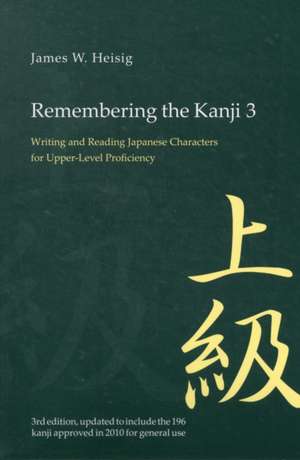Remembering Kanji V3 (3rd): Poetry from China, Formosa, and Beyond: Remembering the Kanji
Autor James W. Heisigen Limba Engleză Paperback – 14 sep 2012
Preț: 264.12 lei
Nou
Puncte Express: 396
Preț estimativ în valută:
50.54€ • 52.77$ • 41.83£
50.54€ • 52.77$ • 41.83£
Carte disponibilă
Livrare economică 15-29 martie
Preluare comenzi: 021 569.72.76
Specificații
ISBN-13: 9780824837020
ISBN-10: 0824837029
Pagini: 364
Dimensiuni: 152 x 226 x 25 mm
Greutate: 0.59 kg
Ediția:Revised
Editura: University of Hawaii Press
Seria Remembering the Kanji
ISBN-10: 0824837029
Pagini: 364
Dimensiuni: 152 x 226 x 25 mm
Greutate: 0.59 kg
Ediția:Revised
Editura: University of Hawaii Press
Seria Remembering the Kanji
Descriere
Students who have learned to read and write the kanji taught in Japanese schools run into the same difficulty that Japan university students themselves face: the number of characters included in the approved list is not sufficient for advanced reading and writing. Although each academic specialisation requires supplementary kanji of its own, there is considerable overlap. With that in mind, this book employs the same methods as <em>Volumes 1</em> and <em>2</em> of <em>Remembering the Kanji</em> to introduce additional characters useful for upper-level proficiency, bringing the total of all three volumes to 3,000 kanji.<br><br> The 3rd edition has been updated to reflect the 196 new kanji approved by the government in 2010, all of which have been relocated in <em>Volume 1</em>. The selection of 800 new kanji is based on frequency lists and cross-checked against a number of standard Japanese kanji dictionaries. <br><br> Separate parts of the book are devoted to learning the writing and reading of these characters. The writing requires only a handful of new “primitive elements.” A few are introduced as compound primitives (“measure words”) or as alternative forms for standard kanji. The majority of the kanji are organised according to the elements introduced in <em>Volume 1.</em> <br><br> As in <em>Volume 2</em>, Chinese readings are arranged into groups for easy reference, enabling the student to take advantage of the readings assigned to “signal primitives” already learned.<br><br> Seven indexes include hand-drawn samples of the new characters introduced and cumulative lists of the key word and primitive meaning, and of the Chinese and Japanese pronunciations, that appear in all 3 volumes of the series.







